| Listing 1 - 10 of 10 |
Sort by
|
Book
ISBN: 2707171794 Year: 2003 Publisher: Paris : Découverte,
Abstract | Keywords | Export | Availability | Bookmark
 Loading...
Loading...Choose an application
- Reference Manager
- EndNote
- RefWorks (Direct export to RefWorks)
Au début des années trente, des auteurs comme Horkheimer, Marcuse, Adorno et Benjamin formèrent le projet d'une théorie critique qui fut nommé par la suite École de Francfort. Ce projet consistait initialement à articuler une philosophie sociale inspirée par le marxisme et les différentes sciences sociales. Dans les décennies qui suivirent, il conduisit à l'élaboration d'une sociologie critique et d'une psychologie sociale de la domination, puis il s'étendit à la théorie de l'art, à la critique de la culture et de la modernité. Où en est la théorie critique ? Quel rapport entretient-elle avec son projet initial ? Dans quelles voies est-elle actuellement engagée ? À quels objets peut-elle encore être appliquée ? Quels enseignements la philosophie politique et les sciences sociales contemporaines peuvent-elles en tirer ? Cet ouvrage tente de répondre à ces questions en réunissant deux types de contribution : plusieurs articles écrits par des représentants actuels de la théorie critique (J. Habermas, A. Honneth, N. Fraser, S. Benhabib), et une série de textes qui reflètent la réception récente de l'École de Francfort en France. Ces différentes contributions dressent un panorama des orientations actuelles de la théorie critique et des différents débats auxquels elle est confrontée. Elles appellent ainsi un programme de recherche interdisciplinaire fécond, un projet théorique et politique à poursuivre ou à renouveler.
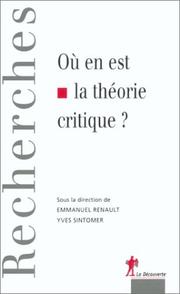
ISSN: 12584002 ISBN: 9782707139344 2707139343 Year: 2003 Publisher: Paris: La Découverte,
Abstract | Keywords | Export | Availability | Bookmark
 Loading...
Loading...Choose an application
- Reference Manager
- EndNote
- RefWorks (Direct export to RefWorks)
Critical theory. --- Frankfurt school of sociology. --- Théorie critique --- Ecole de Francfort (Sociologie) --- Critical theory --- Frankfurt school of sociology --- Théorie critique --- Ecole de Francfort --- Réception d'Adorno en France --- Sociologie --- École de Francfort (sociologie)
Book
ISBN: 2747552470 9782747552479 Year: 2003 Publisher: Paris: L'Harmattan,
Abstract | Keywords | Export | Availability | Bookmark
 Loading...
Loading...Choose an application
- Reference Manager
- EndNote
- RefWorks (Direct export to RefWorks)
Postmodernism --- Discourse analysis --- Frankfurt school of sociology --- Postmodernisme --- Analyse du discours --- Ecole de Francfort (Sociologie) --- Adorno, Theodor W., --- Postmodernism.
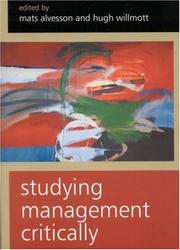
ISBN: 0761967370 0761967362 9786610370269 1446220036 1446222861 1280370262 1412931312 9781412931311 9780761967378 9781446220030 9781446222867 9781280370267 6610370265 Year: 2003 Publisher: London: Sage,
Abstract | Keywords | Export | Availability | Bookmark
 Loading...
Loading...Choose an application
- Reference Manager
- EndNote
- RefWorks (Direct export to RefWorks)
Drawing upon a range of influential contemporary movements in the social sciences, primarily upon critical traditions, this text provides a wide-ranging analysis of management and its various specialisms.
Management --- Critical theory --- Willmott, Hugh --- Management. --- Business & Economics --- Management Styles & Communication --- Management Theory --- #SBIB:043.IOS --- #SBIB:35H302 --- #SBIB:316.334.2A551 --- Organisatieleer: processen --- Partijen en strategieën in de onderneming: ondernemingsbeleid en management --- Critical theory. --- Critical social theory --- Critical theory (Philosophy) --- Critical theory (Sociology) --- Negative philosophy --- Administration --- Criticism (Philosophy) --- Philosophy, Modern --- Rationalism --- Sociology --- Frankfurt school of sociology --- Socialism --- Industrial relations --- Organization --- Study and teaching.
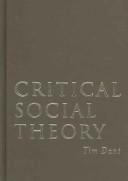
ISBN: 0761954791 9780761954798 Year: 2003 Publisher: London: Sage,
Abstract | Keywords | Export | Availability | Bookmark
 Loading...
Loading...Choose an application
- Reference Manager
- EndNote
- RefWorks (Direct export to RefWorks)
Critical theory --- Social sciences --- Philosophy --- #SBIB:316.21H21 --- #SBIB:044.AANKOOP --- Theoretische sociologie: kritische theorie en de Frankfurter Schule --- Critical theory. --- Philosophy. --- Social philosophy --- Social theory --- Critical social theory --- Critical theory (Philosophy) --- Critical theory (Sociology) --- Negative philosophy --- Criticism (Philosophy) --- Philosophy, Modern --- Rationalism --- Sociology --- Frankfurt school of sociology --- Socialism --- Social sciences - Philosophy
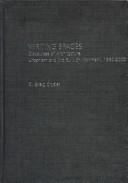
ISBN: 1134477937 1135679584 1280225319 9786610225316 0203402685 9780203402689 9780415274920 0415274923 9780415274937 0415274931 6610225311 0415274923 0415274931 9781134477937 9781135679583 9781280225314 9781410600110 9781135679538 9781135679576 9780805829181 9780805829198 9781134477883 9781134477920 1134477929 Year: 2003 Publisher: New York London Routledge
Abstract | Keywords | Export | Availability | Bookmark
 Loading...
Loading...Choose an application
- Reference Manager
- EndNote
- RefWorks (Direct export to RefWorks)
Writing Spaces examines some of the most important discourses in spatial theory of the last four decades, and considers their impact within the built environment disciplines. The book will be a key resource for courses on critical theory in architecture, urban studies and geography, at both the graduate and advanced undergraduate level.
Communication in architecture. --- Academic writing. --- Architecture --- Cities and towns --- Critical theory. --- Critical social theory --- Critical theory (Philosophy) --- Critical theory (Sociology) --- Negative philosophy --- Criticism (Philosophy) --- Philosophy, Modern --- Rationalism --- Sociology --- Frankfurt school of sociology --- Socialism --- Learned writing --- Scholarly writing --- Authorship --- Communicative architecture --- Philosophy.
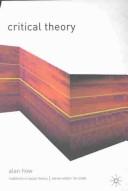
ISBN: 0333751515 0333751523 Year: 2003 Publisher: New York : Palgrave Macmillan,
Abstract | Keywords | Export | Availability | Bookmark
 Loading...
Loading...Choose an application
- Reference Manager
- EndNote
- RefWorks (Direct export to RefWorks)
Critical theory. --- Théorie critique --- Habermas, Jürgen. --- Critical theory --- #SBIB:316.21H21 --- #SBIB:033.AANKOOP --- Critical social theory --- Critical theory (Philosophy) --- Critical theory (Sociology) --- Negative philosophy --- Criticism (Philosophy) --- Philosophy, Modern --- Rationalism --- Sociology --- Frankfurt school of sociology --- Socialism --- Theoretische sociologie: kritische theorie en de Frankfurter Schule --- Habermas, Jurgen --- Habŏmasŭ, Wirŭgen --- Habŏmasŭ --- Khabermas, I︠U︡. --- Khabermas, I︠U︡rgen --- Ha-pei-ma-ssu, Yu-erh-ken --- Habeimasi --- הברמאס, יורגן --- יורגן הברמס --- 哈贝马斯 --- Théorie critique --- Habermas, Jürgen. --- Habermas, Jürgen --- Habermas, Jürgen
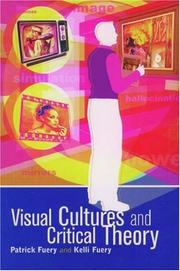
ISBN: 0340807482 9780340807484 Year: 2003 Publisher: London : New York : Arnold Distributed in the United States of America by Oxford University Press,
Abstract | Keywords | Export | Availability | Bookmark
 Loading...
Loading...Choose an application
- Reference Manager
- EndNote
- RefWorks (Direct export to RefWorks)
We live in a world of the image. In many ways images have replaced words as the defining aspect of cultural identity, while at the same time they have become part of our global culture. The rapidly developing discipline of visual cultural studies has become the key area for examining the issues of the image. Visual Cultures and Critical Theory includes and explains issues and concepts such as psychoanalysis, cultural theory, postmodernism, Queer theory, gender studies, and narrative theory. The major theorists are all covered as the authors look at the significance of the visual in the works of Foucault, Barthes, Lacan, Derrida, Baudrillard, and Guattari. Taking up a range of themes such as spectatorship, pleasure, power, doubles, hallucination, and the frame, the book explains them within the context of these theoretical developments. Visual Cultures and Critical Theory will provide students with a clear guide for understanding ideas of critical theory through the visual.
#SBIB:309H040 --- #SBIB:309H520 --- #SBIB:316.7C120 --- #SBIB:053.AANKOOP --- Populaire cultuur algemeen --- Audiovisuele communicatie: algemene werken --- Cultuursociologie: algemene en theoretische werken --- Critical theory --- Imagery (Psychology) --- Visual communication --- Graphic communication --- Imaginal communication --- Pictorial communication --- Communication --- Imagery, Mental --- Images, Mental --- Mental imagery --- Mental images --- Imagination --- Visualization --- Critical social theory --- Critical theory (Philosophy) --- Critical theory (Sociology) --- Negative philosophy --- Criticism (Philosophy) --- Philosophy, Modern --- Rationalism --- Sociology --- Frankfurt school of sociology --- Socialism --- Social aspects --- IMAGERIE (PSYCHOLOGIE) --- COMMUNICATION VISUELLE --- THEORIE CRITIQUE --- ASPECT SOCIAL

ISBN: 0791486982 141752412X 9781417524129 079145696X 9780791456965 0791456951 9780791456958 9780791486986 Year: 2003
Abstract | Keywords | Export | Availability | Bookmark
 Loading...
Loading...Choose an application
- Reference Manager
- EndNote
- RefWorks (Direct export to RefWorks)
In Ricoeur's Critical Theory, David M. Kaplan revisits the Habermas-Gadamer debates to show how Paul Ricoeur's narrative-hermeneutics and moral-political philosophy provide a superior interpretive, normative, and critical framework. Arguing that Ricoeur's unique version of critical theory surpasses the hermeneutic philosophy of Gadamer, Kaplan adds a theory of argumentation necessary to criticize false consciousness and distorted communication. He also argues that Ricoeur develops Habermas's critical theory, adding an imaginative, creative dimension and a concern for community values and ideas of the Good Life. He then shows how Ricoeur's political philosophy steers a delicate path between liberalism, communitarianism, and socialism. Ricoeur's version of critical theory not only identifies and criticizes social pathologies, posits Kaplan, but also projects utopian alternatives for personal and social transformation that would counter and heal the effects of unjust societies. The author concludes by applying Ricoeur's critical theory to three related problems—the politics of identity and recognition, technology, and globalization and democracy—to show how his works add depth, complexity, and practical solutions to these problems.
Critical theory. --- Critical social theory --- Critical theory (Philosophy) --- Critical theory (Sociology) --- Negative philosophy --- Criticism (Philosophy) --- Philosophy, Modern --- Rationalism --- Sociology --- Frankfurt school of sociology --- Socialism --- Ricoeur, Paul. --- Ricœur, Paul --- Lü-ko-erh --- Ricœur, P. --- Li-kʻo, Pao-lo --- ريكور، بول --- ريكور، پول --- Рикёр, Поль --- Rikër, Polʹ --- Ricœur, Jean Paul Gustave --- Critical theory --- Ricœur, Paul. --- Political science --- Philosophy --- History --- 20th century --- Habermas, Jürgen --- Gadamer, Hans Georg --- Ricur, Paul.

ISBN: 0415274923 0415274931 9780415274937 Year: 2003 Publisher: London : Routledge,
Abstract | Keywords | Export | Availability | Bookmark
 Loading...
Loading...Choose an application
- Reference Manager
- EndNote
- RefWorks (Direct export to RefWorks)
Academic writing. --- Architecture --- Cities and towns --- Communication in architecture. --- Critical theory. --- Philosophy. --- 711 <05> --- 72 <05> --- 711.4 --- 72.01 --- 72.036 --- 711.4 Gemeentelijke planologie. Stadsplanning. Stedenbouw --- Gemeentelijke planologie. Stadsplanning. Stedenbouw --- 72.036 Moderne bouwkunst. Architectuur van de 20e eeuw --- Moderne bouwkunst. Architectuur van de 20e eeuw --- 72.01 Architectuurtheorie. Bouwprincipes. Esthetica van de bouwkunst. Filosofie van de bouwkunst --- Architectuurtheorie. Bouwprincipes. Esthetica van de bouwkunst. Filosofie van de bouwkunst --- 72 <05> Architectuur. Bouwkunst--Tijdschriften --- Architectuur. Bouwkunst--Tijdschriften --- 711 <05> Ruimtelijke ordening. Planologie. Stedebouw--Tijdschriften --- Ruimtelijke ordening. Planologie. Stedebouw--Tijdschriften --- Communication en architecture --- Ecriture savante --- Villes --- Théorie critique --- Philosophie --- Academic writing --- Communication in architecture --- Critical theory --- Critical social theory --- Critical theory (Philosophy) --- Critical theory (Sociology) --- Negative philosophy --- Criticism (Philosophy) --- Philosophy, Modern --- Rationalism --- Sociology --- Frankfurt school of sociology --- Socialism --- Communicative architecture --- Learned writing --- Scholarly writing --- Authorship --- Philosophy --- 72.01 Theory and philosophy of architecture. Principles of design, proportion, optical effect --- Theory and philosophy of architecture. Principles of design, proportion, optical effect
| Listing 1 - 10 of 10 |
Sort by
|

 Search
Search Feedback
Feedback About UniCat
About UniCat  Help
Help News
News